What do Donald Trump’s cabinet nominees and advisors think about climate and sustainability? As you would expect, it’s not looking good for anyone who cares about a habitable planet or livable communities. President-elect Trump is putting together a climate-denying cabal of extreme right-wingers and corporate sympathizers likely to roll back environmental protections, halt smart-growth efforts, and undo progress toward environmental justice.
- EPA Administrator: Scott Pruitt
- Secretary of State: Rex Tillerson
- Secretary of Interior: Ryan Zinke
- Secretary of Energy: Rick Perry
- Attorney General: Jeff Sessions
- Secretary of Transportation: Elaine Chao
- Secretary of Housing and Urban Development: Ben Carson
- Secretary of Health and Human Services: Tom Price
- Secretary of Defense: James Mattis
- U.N. Ambassador: Nikki Haley
- Chief of Staff: Reince Priebus
- Chief Strategist: Steve Bannon
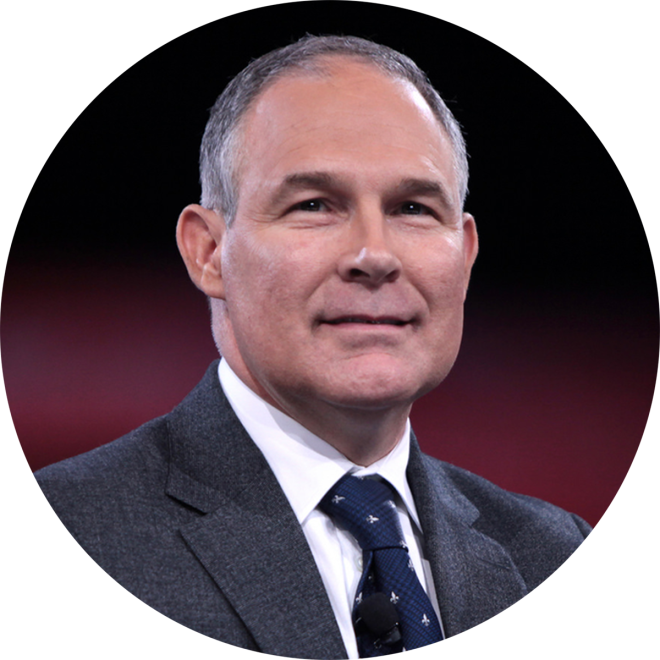
EPA Administrator
Scott Pruitt
Oklahoma Attorney General Scott Pruitt has tried to the sue the pants off the EPA. If confirmed by the Senate, he’ll be running it. He has strong ties to the fossil fuel industry, and was a leader in the push by state attorneys general to file lawsuits against President Obama’s Clean Power Plan. His own LinkedIn profile claims he “led the charge with repeated notices and subsequent lawsuits against the U.S. Environmental Protection Agency for their leadership’s activist agenda and refusal to follow the law.” A 2014 New York Times investigation found that Pruitt took letters written by energy lobbyists, put them nearly word-for-word on his professional stationary, and sent them under his own name to the EPA. This year, when a group of state attorneys general announced that they would investigate companies suspected of misleading the public about climate change, Pruitt said it was “inappropriate” for AGs to “attempt to silence core political speech on one of the major policy debates of our time.” So that’s what he thinks about climate change: It’s a “debate.”
What’s at stake: A whole lot. The EPA is responsible for implementing federal laws that protect air and water, and determining what the latest science tells us about protecting human health. The agency is involved in everything from helping to fix the Flint water crisis to overseeing cleanup of toxic sites. Pruitt could gum up the works on all manner of environmental endeavors. Most notably, Pruitt would be the man happily leading the charge to undo the Clean Power Plan, one of Obama’s most ambitious efforts to fight climate change.
Photo by Gage Skidmore
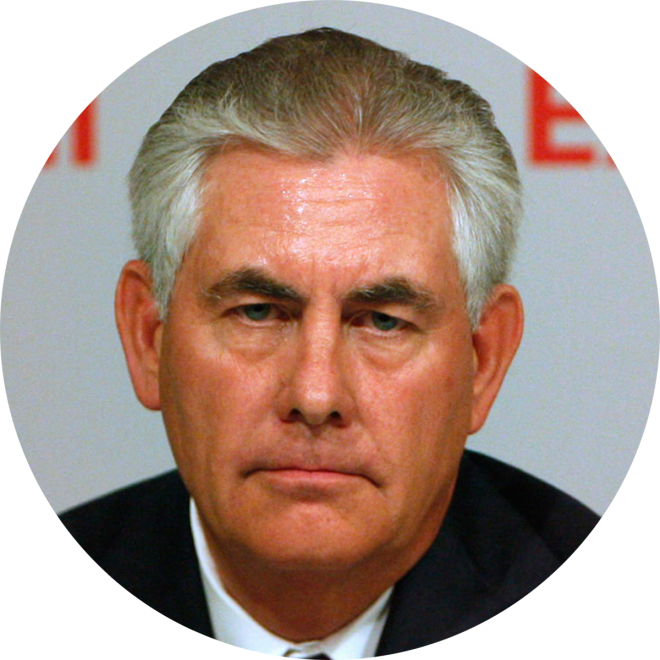
Secretary of State
Rex Tillerson
Trump has tapped ExxonMobil CEO Rex Tillerson to head the State Department. In 2012, Tillerson suggested that fears about climate change are overblown and society will be able to adapt. More recently, he said that climate models are not reliable enough to guide policymaking and that there’s no scientific basis for the goal of keeping warming below 2 degrees C above pre-industrial levels. Tillerson has a cozy relationship with Trump’s favorite petrostate kleptocrat, Vladimir Putin, and his company lost lucrative drilling contracts because of U.S. sanctions against Russia. Though ExxonMobil officially acknowledges that climate change is happening and says the problem “warrants action,” the company’s long-term record on the issue is terrible. It has spent millions funding climate-denying groups and politicians. Investigations last year revealed that Exxon knew about climate change way back in the 1970s and hid it from the public. That revelation has led to lawsuits and investigations of the oil giant, and the company has retaliated by filing suits against state attorneys general.
What’s at stake: The State Department represents the U.S. in climate negotiations. Secretary of State John Kerry was instrumental both in crafting bilateral climate agreements, like the U.S.-China deal of 2014, and international pacts, like last year’s landmark Paris Agreement. If Tillerson takes the reins at State, don’t expect him to follow in Kerry’s footsteps.
Photo by REUTERS/Jessica Rinaldi

Secretary of Interior
Ryan Zinke
Trump intends to hand control of the Interior Department over to Montana Rep. Ryan Zinke. Unlike many other Republicans, Zinke advocates keeping federal lands under federal control, as do Trump and Donald Trump Jr. Zinke even resigned as a delegate to the Republican National Convention last summer because the party platform called for turning some federal lands over the states. He is an avid hunter and fisher, and his Twitter bio says he’s a “Teddy Roosevelt fan.” But conservationists may be less impressed by what Zinke actually wants to do on those federal lands. He is a particular fan of coal, which his home state produces a lot of, mostly mined from federal land. He also wants to expedite oil and gas drilling on federal land. Zinke has flopped around on global warming: Back in 2008, he talked about climate change being a national security issue, but when running for Congress in 2014, Zinke said climate change is “not proven science.”
What’s at stake: The Interior Department manages more than 500 million acres of federal lands as well as offshore areas. Under the Obama administration, the department put a moratorium on new leases to coal companies and started trying to figure out how better to account for climate change when leasing land to fossil fuel companies. Zinke, who opposes the coal leasing moratorium, is likely to undo those efforts.
Photo by Gage Skidmore
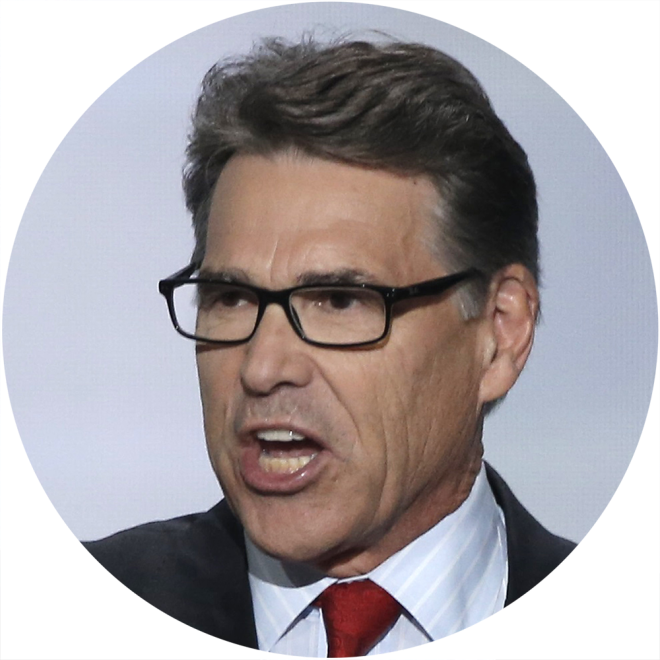
Secretary of Energy
Rick Perry
Rick Perry once said he would eliminate the Department of Energy. Now he’s poised to run it. The former Texas governor and Dancing With the Stars contestant is Trump’s choice for secretary of energy. During his own run for the Republican nomination for president in 2011, Perry named the Energy Department as one of three that he wanted to dismantle — or he would have, except he forgot its name. Perry’s primary energy-related experience has been favoring the oil and gas industry while he was in office and, now that he’s out, getting paid by that industry. He sits on the board of Energy Transfer Partners, the company building the controversial Dakota Access Pipeline, and he owns $100,000 worth of the company’s stock. And Perry serves on the board of Sunoco, which is also involved in the Dakota Access Pipeline. Perhaps unsurprisingly, Perry is a proud climate change denier. While he was governor of Texas, his administration censored a report on sea-level rise. He responded to a severe drought by calling for three days of prayer. And he doesn’t think the science on climate change is “settled.” No wonder Texas political insiders call him “Bush without the brains.”
What’s at stake: The Department of Energy maintains the nation’s nuclear weapons program, manages nuclear and radioactive waste, and runs science research labs and innovation programs. It’s unclear how much Perry will value — or even understand — the department’s scientific research programs.
Photo by REUTERS/Mike Segar
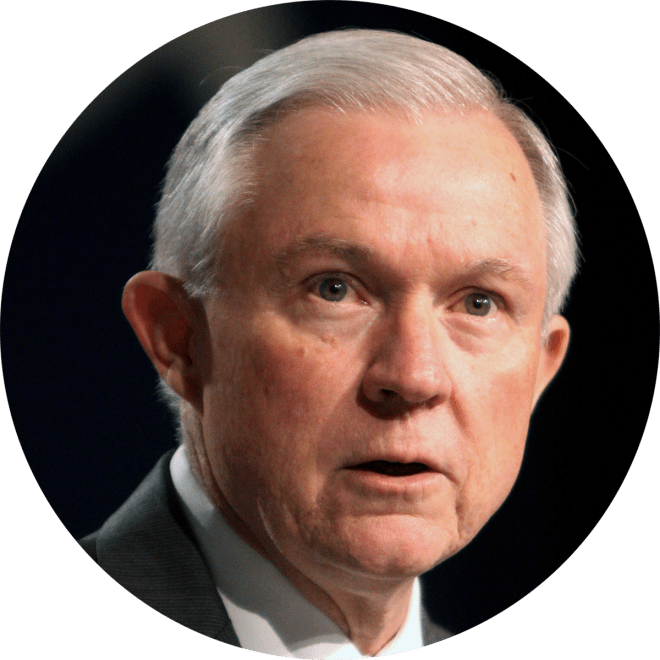
Attorney General
Jeff Sessions
Sen. Jeff Sessions of Alabama may be best known for his racist and xenophobic views, but he’s also an outspoken climate science denier. Last year, he said that carbon dioxide is “not a pollutant,” it’s just “plant food.” Speaking about climate change on the Senate floor in 2014, he said, “I don’t suppose we know enough now to answer this question conclusively either way, but I just would say, there has been a lot of exaggeration, there has been a lot of hype.” Also in 2014, he accused White House Science Advisor John Holdren of trying to advance a “political agenda” by discussing the links between climate change and weather events like droughts. Unsurprisingly, Sessions boasts a terrible voting record on all things environmental, including his votes to push through the Keystone XL pipeline, kill clean energy tax credits, and block the EPA from implementing the Clean Power Plan.
What’s at stake: The U.S. attorney general, head of the Department of Justice, is the nation’s chief law enforcement officer. In the past, the department has fined corporations like BP, ExxonMobil, Chevron, and Koch Industries for polluting. But don’t expect Sessions to be an enthusiastic enforcer of environmental statutes. The Justice Department is currently defending the Clean Power Plan in the courts; that could get messy after Trump and his AG pick take office.
Photo by Gage Skidmore
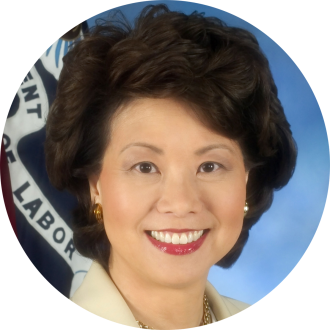
Secretary of Transportation
Elaine Chao
Elaine Chao is a career bureaucrat, embodying the permanent governing class of D.C. insiders that Trump supposedly came to Washington to throw out. She was deputy transportation secretary under President George H.W. Bush and served as George W. Bush’s secretary of labor. She’s married to Senate Majority Leader Mitch McConnell. When she’s not in government, she can be found at the Heritage Foundation, the arch-conservative think tank. She has also been a banker for CitiCorp. Green groups worry about how she will approach environmental issues, noting that at Heritage she opposed government action on climate change, and she sided with fossil fuel corporations that mistreat their workers, like Massey Energy, at the Department of Labor. In 2015, she resigned from the board of Bloomberg Philanthropies after the foundation decided to ramp up its “Beyond Coal” campaign.
What’s at stake: Would Chao take climate change into account — either climate resilience or the carbon footprint of a project — when choosing transportation projects to support? There’s no reason to be optimistic.
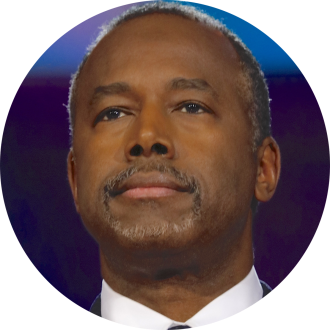
Secretary of Housing and Urban Development
Ben Carson
Ben Carson, a retired surgeon, has no experience working in government or managing a large organization, let alone one related housing or cities. When asked by Fox News what he knows about housing policy, Carson responded, “I know that I grew up in the inner city and have spent a lot of time there.” If confirmed to head the Department of Housing and Urban Development, his extreme right-wing views would be a guiding force. In an op-ed last year, Carson attacked a HUD rule aimed at curbing housing discrimination — one of HUD’s core responsibilities — and criticized such efforts as “failed socialist experiments.” A cynic might suggest that Trump, who himself has been sued by the federal government for discriminating against prospective African-American tenants, chose Carson to put an African-American face on his planned evisceration of housing integration efforts. Carson is also, as you might expect, a climate science denier, having asserted, “There’s always going to be either cooling or warming going on.”
What’s at stake: HUD enforces fair housing laws and runs other programs to help meet Americans’ housing needs. Under Obama, it started to focus on smart growth and building more housing near transit hubs in cities. Trump and Carson would be unlikely to prioritize or continue such efforts.
Photo by Shutterstock

Secretary of Health and Human Services
Tom Price
Rep. Tom Price, Republican of Georgia, is a serious threat to your reproductive rights. He opposes the birth control mandate of the Affordable Care Act (and the rest of the act as well), and he wants to defund Planned Parenthood and restrict abortion access. He’s against pretty much all government involvement in health care. Five thousand physicians across the country have signed a statement declaring Price’s nomination to be a threat to their patients. And, of course, Price is a climate change denier.
What’s at stake: The HHS secretary won’t be able to undo Obamacare (or its birth control mandate) on his own, but he can do a lot to hamper the law’s implementation until Congress and Trump get around to repealing it. Also, HHS provides significant funding for Planned Parenthood, and though Congress controls the purse strings, Price, if confirmed, would surely do whatever he can to disrupt that support.
Photo by IowaPolitics.com

Secretary of Defense
James Mattis
Retired Marine General James “Mad Dog” Mattis appears to hold different views on climate change than many of Trump’s other cabinet choices. Mattis hasn’t said much publicly about the issue, but Stephen Cheney, a retired Marine brigadier general who’s been a consistent advocate for climate action, told Climate Home that Mattis understands the links between global warming and national security. Mattis has also expressed frustration at the military’s reliance on fossil fuels. While serving in Baghdad in 2003, he continually outran his fuel supply and was forced to take trips at a slower pace. In a post-combat report, he asked the Department of Defense to “unleash us from the tether of fuel.”
What’s at stake: The Department of Defense has in recent years been drawing connections between security and a warming world; in February, the Pentagon called for prioritizing climate change in all military planning and training. If Mattis is concerned about climate change, he could continue those kinds of efforts and be a rare voice of climate reason in Trump’s cabinet.
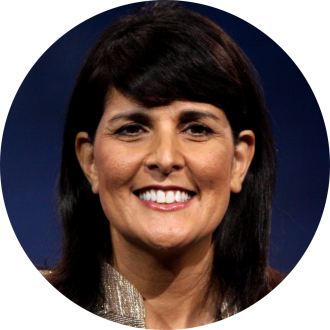
U.N. Ambassador
Nikki Haley
South Carolina Gov. Nikki Haley is poised to become ambassador to the United Nations despite her limited foreign policy experience. Then again, her boss doesn’t have any foreign policy experience either. As an Indian American and the first woman selected for Trump’s cabinet, Haley stands out among the sea of mostly white men — but her views on climate change fit right in. While not an outright climate denier, she has ignored the threats climate change poses to her state and fought against the Clean Power Plan.
What’s at stake: The U.N. has made fighting climate change a priority, but Trump doesn’t want to play along. He has pledged to pull the U.S. out of the Paris Agreement. Haley would be a key player in extricating the U.S. from global climate action and could also try to undermine cooperation of other nations on the issue.
Photo by Gage Skidmore
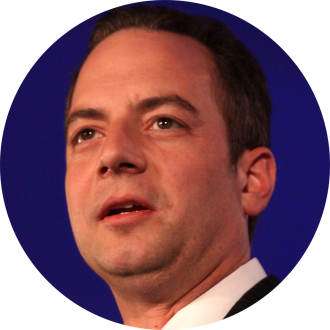
Chief of Staff
Reince Priebus
Republican National Committee Chair Reince Priebus, dubbed the “Normalizer in Chief” by the New York Times, is perhaps Trump’s favorite member of the GOP establishment — and like most of that establishment, he is dead wrong about climate change. Last year, he criticized Democrats for considering global warming to be a national security threat. And recently, Priebus assured Fox News that Trump still thinks climate change is “a bunch of bunk,” despite the president-elect’s claim that he will approach the issue with “an open mind.”
What’s at stake: The chief of staff advises the president and controls who gets access to him and what gets put on his agenda. You can bet that Priebus, a party loyalist, will be promoting traditionally Republican views on energy, climate change, and environmental issues.
Photo by Gage Skidmore

Chief Strategist
Steve Bannon
Steve Bannon, who ran Trump’s campaign in its final months, is controversial for his racist, sexist, and homophobic comments, but he’s also got controversial views about climate change. He accused Pope Francis of “hysteria” for raising concern about the issue. While Bannon was at the helm of the right-wing Breitbart News Network, it repeatedly dismissed people concerned about climate change as “alarmists,” called renewable energy “a lame duck,” and described wind turbines as “bat-chomping, bird-slicing eco-crucifixes.” A Breitbart writer, James Delingpole, said one of Bannon’s “pet peeves is the great climate-change con.” Bannon probably doesn’t like LED lights either: “Darkness is good,” he told the Hollywood Reporter two weeks after the election. “Dick Cheney. Darth Vader. Satan. That’s power.” Someone get this man a cloak and hood — phantom menace no more.
What’s at stake: Bannon will be advising Trump on all manner of issues. You can expect him to be encouraging dirty energy, disparaging clean energy, and inveighing against all forms of climate action.
Photo by Don Irvine


